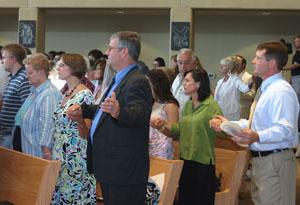
By Deacon Frank Agnoli
News that a new translation of the Roman Missal is coming has been met with mixed reviews. On the one hand there are those who are greeting the new translation with the enthusiasm one would expect for Christ’s Second Coming. In the new Missal, they see hope that all that is “wrong” with the church will be fixed. On the other hand, there are those who view the new Missal as the harbinger of the apocalypse, a sign of all that is “wrong” with Catholicism. While both extremes have their points, the truth lies somewhere in the middle. No translation is perfect; any translation involves compromise, discernment of what the church needs at this moment in her history, and the balancing of gains and losses. In this article, we’ll take a look at objections that have been raised to the new translation. Next time, we will review what we are gaining with a new Missal.
Practical Objections
Introducing a new Missal is going to be a lot of work, especially for our pastors. Not only will they need to learn about the new Missal, but they’ll need to prepare their parishes — and make sure that budgets account for buying new catechetical and ritual books. It can be frustrating to have one more thing added to an already lengthy list of responsibilities, especially when it isn’t easy to explain some of the more technical aspects of the new Missal.
Even if we, pastors and people alike, put in all the work that’s needed, some texts will be hard to proclaim and will sound too formal, even artificial, to our ears — at least at the beginning. We will need to read texts that we’ve had memorized, and we’ll have to learn new musical settings for the responses at Mass. We’ll make mistakes, and our worship may feel awkward for a while.
As Father Paul Turner joked at his workshop on Nov. 3, pastors aren’t being stopped at the door and begged for a new translation of Eucharistic Prayer III! In fact, they’re more likely to hear: aren’t there more important things to be doing? The easy answer is: of course there are many priorities clamoring for our attention. The more thoughtful answer may be: the liturgy is the most important action that we do as Catholics; is it not worth the time and effort to celebrate it well?
Other Objections
When the Missal was first translated after Vatican II, Catholics worked with other Christian communities to develop a set of common Mass texts in English — such as the Nicene and Apostles’ Creeds, the Lord’s Prayer, and the greetings. Since then, to one degree or another, these communities have let go of some of these common texts. However, with our new Missal, we will only be left with the Lord’s Prayer in common. From the Catholic perspective, at this time in our history, uniformity within the Catholic Church is considered more pressing than uniformity between different Christian communities which speak English.
For some, the issue of inclusive language is very important. On the one hand, the new rules for translation do not allow for the adjustment of texts to make them gender-neutral. On the other hand, the fact that the new rules call for a more literal translation does mean that the texts that we will receive will be more varied and more inclusive.
When our liturgical books were first being prepared after the Second Vatican Council, the International Commission on English in the Liturgy (ICEL) not only translated the texts that came from Rome but also composed new texts in English. In this new edition of the Missal, no newly-composed texts will be allowed. Some see in this the loss of an opportunity to help the liturgy reflect the experiences of Catholics today.
Finally, there are those who distrust authority in the church and see any action by Rome as the misuse of power. We do tend to be wary of authority in this country, and the church’s recent history has done little to reassure many. While it may be easy to be critical of bishops (and liturgists) and to fall into the trap of believing everything the secular media has to say about our church, it seems to me that, in the long run, such distrust can only damage the Body of Christ.
One final comment…
Change is difficult, and often engenders strong feelings — especially when that change comes to something important and dear to us, such as the liturgy. Perhaps strong feelings in reaction to the new Missal are not a bad thing; they may be a sign of how important the Mass is to us. Yet, we need to remember the virtue of charity; our responses need to be measured and respectful. There is nothing more unfair than assigning the most negative of motives to another. New texts will be clumsy at first; it will take time to get used to them. We need to be patient with one another and with the process of implementation; over time, they will become our prayers — in the depths of our bones — just the way that the prayers we are using now became ours over time.
Next time: What gifts are we being given?
(Deacon Agnoli is director of liturgy for the Davenport Diocese.)








